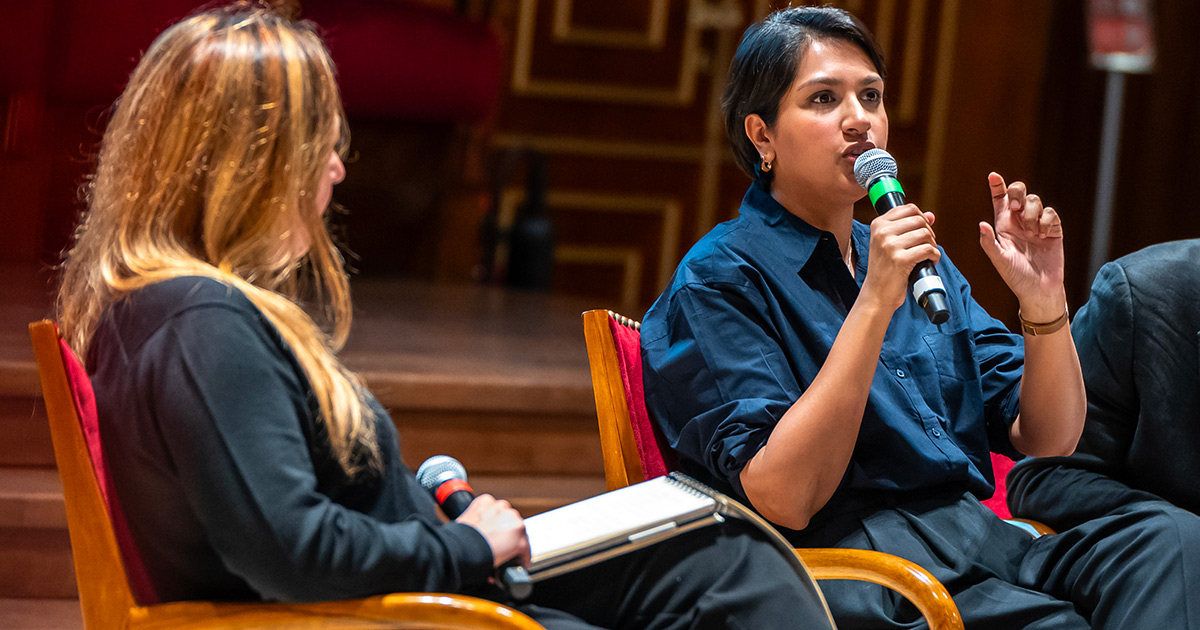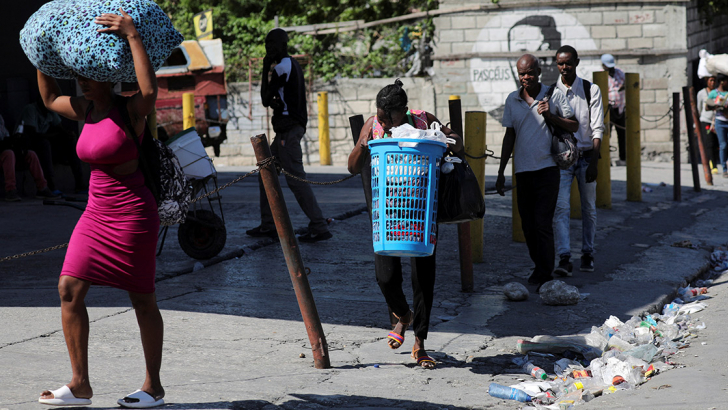SCIENZA E RICERCA
Behind racism and discrimination. A conversation with Angela Saini

Angela Saini and Elisabetta Tola during the talk at the University of Padua. Picture: Alessandra Lazzarotto
Angela Saini, an award-winning science journalist and author of many acclaimed books, visited the University of Padova on April 16th. Before heading to Palazzo Bo, in the Aula Magna, for an event open to the public, Angela Saini stopped by our newsroom at Il Bo Live, and we had the opportunity to chat with her in our radio studio.
During our conversation with her, we explore the intricate weave of her three pivotal works: "Inferior," "Superior," and "The Patriarchs." Saini's quest to unravel the complex patterns of inequality has established a common thread throughout her books: the historical and sociocultural roots of systemic disparities.
"Underneath everything is the principle that if there is a system of inequality...it must have some kind of origins or roots. There must be a history there to tell us that we can't take these things as natural," Saini explains. In fact, she continues, it's quite dangerous to take them as natural because then we become fatalistic about sexism, racism, gender inequality, or patriarchy.
Science's quest for neutrality, often claiming to be data-driven and factual, is an illusion Saini deconstructs with a very thorough approach. She notes the profession's vulnerability to the same curiosities that plague all of humanity, a fascination to find scientific explanations for social phenomena that risks leading us down problematic paths. "Scientists are humans...they have life experiences, and they are driven by curiosity" she remarks, adding, “we all wonder whether there are some natural drivers to the way the world looks, to complex phenomena like inequality or economic development, for instance. We ask ourselves whether there is something biological that underlies everything, or is it something else? And I think we have approached these questions in isolation for too long in different disciplines. Biologists will look at them from a purely biological perspective. But it's not a purely biological question at all.
“ Discrimination and racism are still quite alive
We are social creatures, Saini remarks. That means that we humans live in so many different ways, it’s almost impossible to isolate human nature, and we need to look at everything in conjunction at the overall complexity. Now, this has become very difficult also because of the science overspecialisations, that leads to experts being very much siloed. In fact, she adds, maybe in the past centuries, in times such as the Renaissance, it would have been easier to draw in lots of different disciplines and look at these questions in a more holistic way. Since the end of the XIX century, this has become progressively harder to do. And that’s why we would need a much more interdisciplinary approach.
Saini voices concern about the naiveté that is sometimes apparent in scientific circles, and that can lead to missteps. "I was almost appalled at their lack of historical and political understanding," she adds, reflecting on the many encounters she had with otherwise brilliant minds, as it is clear from the conversations and interviews included in her books. This underscores a pressing need to broaden scientists' horizons beyond their specialisations.
Scientists, geneticists in particular, felt uneasy when her book Superior was published. Many of them reacted, advocating for their genuine commitment to proving racism not only wrong but even based on no scientific facts and claiming that racism belongs to the past, hence it is no longer a threat. However, she highlights that if our contemporary society still has these problems how can we expect scientists to be completely immune? We do not live in completely enlightened times not burdened by any prejudices. On the contrary, discrimination and racism are still quite alive.
Ascolta la prima parte dell'intervista ad Angela Saini
There was a very important recent turning point, according to Saini. “The big turning point I noticed, in the West at least, was the murder of George Floyd in 2020. Suddenly, even geneticists who were quite sceptical of what I was saying turned to embracing it. Since then, I've been working with them. And I think that there has also been a much better dialogue between the social science and the hard sciences and an understanding that biologists don't know everything and they need to learn from these other areas”.
Discussing the cyclical nature of the way genetics is tempted by explaining human behaviour on the basis of natural differences, Saini reflect on the periodic recurrence of deterministic attitudes. “We went through an unfashionable phase towards the end of the 90s-early 2000s, partly because the huge promises made in genomics didn't all come to pass. This idea that we would isolate a gene for everything, that we would solve all these diseases using genetics hasn't been fully realised. So that excitement, in genetics, has died down a bit”.
However, she continues, we now see a new interest in polygenic risk scores. The underlying idea is that because the genomes of huge populations are now available, we could look at social or behavioural traits and start to look at correlations between genetic variants and social traits. However, she admonished, “We must remember they're still only correlations. They don’t imply the existence of any biological mechanism.” However, we do see that there is the temptation to use these risk scores, for example, in teaching or in medicine. And this is something she is very sceptical about. “Unless you have a clear mechanism, how do you know what it is that you're actually looking at? And since we are dealing with very large populations, what does that really mean for the individual?” These are Saini’s questions. And as a matter of fact, is there any sense in the idea of changing for instance the teaching of any one student based on these huge statistical averages over huge populations?
In the end, she adds, these types of practices show that there is an obvious politically-driven assumption based on the same legacy of the past, with the tendency to support a deterministic use of genomics.
Ascolta la seconda parte dell'intervista ad Angela Saini
There is a fundamental role to be played by journalists when looking into these topics, though. The bigger question, in fact, is why there is still such a broad interest towards this approach? Why do we appear, as a society, in general, so convinced that this determinism could work?
Saini reflects also on the human tendency to adopt linear and oversimplified narratives of the past. “Once the past has happened, it's very easy to go through it and join dots in one single narrative”. But, she points out, if we reflect on how uncertain the current times are, we can clearly see that things could go in very different ways with just tiny little changes. Just a small percentage in voting, for instance, could shift the political framework in quite dramatic ways. “History is contingent on that”, she goes on, “And yet we don't think about the past that way. There is a big risk when we draw biology into these grand narratives, as though humans were only ever going to take a specific direction, this direction we know.” The risk is to see as inevitable and natural a certain outcome, while any outcome is in fact the result of complex and diverse causes.
Particularly in The Patriarchs, she shares, “I wanted to challenge this idea that patriarchy was ever inevitable, because people still make this claim that somehow men were only ever going to be in charge. Even if we redid everything, they would still be in power every single time, in every possible universe”. And she doesn’t think this is true, because when you look in fine detail at how this history panned out, patriarchy is likely to be much more recent than we think, and it is also very patchy, since depending on where you are in the world, the development of patriarchy is contingent on so many other factors.
There is a beautiful example in Saini's book that demonstrates exactly how wrong it can be to start from an assumption about the natural order of things. "Europe portrays itself as the place where human rights and principles of equality were invented" she reflects, "And indeed, it was a shock in the mid-19th century for European colonizers of North American territories to encounter societies organized in completely different ways. At that historical moment, for Europeans, patriarchy was indeed a system that fell within the natural order of things. The father was always the head of the family, the monarch was the head of state, and there was a god who was the ultimate authority. Moreover, the colonizers who migrated to North America were indeed building a society where there was no longer a monarch to manage the state. But they did not question the patriarchy in the family or society, there was no equality between men and women in any way. They thought it was natural that way". So when they encountered some Indian nations where women held roles of power, and which were based on matrilineal transmission from one generation to another, it was a real shock for them. They thus interpreted that matriarchy was typical of a primitive society, while evolution naturally led to the development of patriarchy. And this was a truly tragic moment. Firstly, because in this way it was deemed appropriate to frame Native Americans as primitive peoples, which was completely wrong, since they were simply peoples who lived differently, neither superior nor inferior to them. But most importantly, this framing then formed the basis for the deliberate action of imposing a patriarchal model also on the native peoples, since patriarchy was seen as the objective, the natural goal of an evolved society.
Ascolta la terza parte dell'intervista ad Angela Saini
Looking ahead, Saini shares a cautious optimism.
Despite the resurgence of conservative and nationalist movements, she sees hope in the bravery and progressiveness of the younger generation. While we go towards the conclusion of our conversation, Angela Saini refers explicitly to the situation in Iran, as a particularly significant example, that she was dealing with while concluding her book. She had met with many women of the generation that has been fighting the regime, and their view was quite pessimistic. And then the horrible murder of Mahsa Amini changed everything. Now, in Iran, young women and men are not only protesting but keep rebelling against the oppression and show an endurance and a vision that calls for enormous respect. Social conflicts, Saini reminds us, are often terrible but can also open up opportunities for change towards a more equitable and respectful society. That’s one of the reasons why she thinks there is hope: "How can we not have faith in the future in that generation?"






